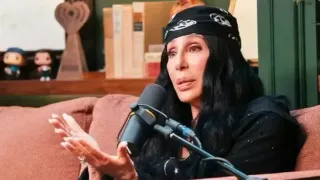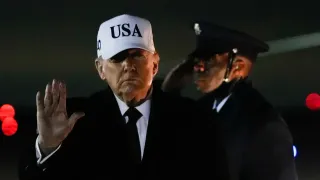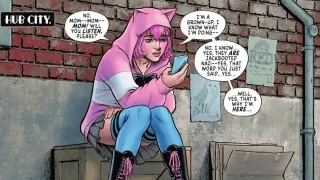May 2, 2022
Peripheral Visions: The Paths of Power
Kilian Melloy READ TIME: 18 MIN.
They coalesce in the shadows and take shape in the corner of your eye. Peripheral Visions: You won't see them coming... until it's too late.
The Paths of Power
Randall Chance, at the tender age of 26, was already a captain of industry. He was the founder, CEO, and chief technical officer of Lockbox, a fintech company that had been a startup only two years earlier but that had powered its way to global dominance in the area of managing cryptocurrency transactions.
Randall was good with numbers, equally at ease with the fluctuating digits of a balance sheet as with the binary quick step of ones and zeroes. But he was troubled by the yes-or-no, up-or-down choice that he, and others at his level of success, were facing. Staring out the floor-to-ceiling windows along one side of the corridor that linked the lobby of Capital Strategies – a conservative think tank, business and lobbying nexus, and mill for legislation that, once drafted, would be sent to lawmakers in over 100 countries for their mandatory approval – Randall considered the vast Texas desert.
Before seceding, Texas had once been one of the largest sates in the union. Now it was its own nation. Troubled by nearly universal poverty and constant battles between warlords, the only means Texas now had of bringing in reliable revenue was by giving think tanks like Capital Strategies a place to establish physical headquarters. That, and a shaky reputation for money laundering, kept the country's Owner class afloat. Personally, Randall worried that Texas would go down in a blaze of chaos at any moment, but so far the private armies – and top-tier battlefield technologies – of the Texas Owners had kept the mayhem at bay so that businessmen from more stable parts of the world could congregate here and get business done.
But what business. Often, it was cut and dried; the same posturing and proceedings as ever, following the same archaic patterns the human race had always followed. Steal from the poor, give to the rich, and tell the gullible yokels that they liked it. Give them a token to seal the deal: Permission to hate. It didn't' matter who.. women, gays, Jews, people of different skin colors or who said different prayers. The formula was as unvarying as it was reliable.
It was a business with high returns and low risk... once you got in, that is. But getting in, and staying in? Well, that could be tricky.
Randall was unsentimental about the brutal nature of the business world and the bloody extremes that politics – always the halfwit handmaid of the rich – sometimes swung to in the course of history, but there was an uneasy feeling in his gut that told him that in order to keep his coveted place among the world's power players he was going to have to agree to, and participate in, some things that were too unsavory even for him.
For the first time in his life, Randall wondered if he had the strength or will – or the callousness of a conscience-free sociopath – that he might need, if things went from bad to worse and The Board determined that the worst course of action would, in fact, be its best.
Pete Stromberg – he'd made his fortune in the parallel fields of video replication software and IP security – appeared at Randall's elbow. "They're ready to go back in, Randall," Pete said.
Randall nodded, still staring out at the lifeless desert that stretched away outside. Hammered by the searing cudgel of global warming and sterilized by UV rays that the tattered ozone layer could no longer deflect or absorb, the Texas desert shimmered with heat that no one – not even the zealot members of the state's militias – could survive. There had been intelligence warnings about possible raids on company outposts, maybe even attacks on private jets and copters as they soared to and from the scattered hi-tech oases of think tanks like this one, but any such activity could only take place at night. Even Texas, once oil-rich, had now been wrung dry, and no one in the civilized world trusted the country enough to sell it solar arrays or other forms of alternative energy that might have met the energy-intensive demands of fleets of climate-controlled military vehicles. Ironic, that, Randall thought as he gave one last long look at the lifeless sands of the Texas desert. This state and its rulers had once used power to throw the world into disarray; now the fruits of what they had sown were theirs to reap.
Would people in the future say the same about the nations of the world if The Board commanded them to do the terrible things they were considering?
Would people in the future discover the existence of The Board, name the names of the men who ran it?
Would there even be people in the future?
***
"Gentlemen." Torias Gundervorg surveyed the room, his pale, serial killer eyes seeming to zero in and grip each man in turn. "We've covered almost all the crucial aspects: Actual and projected mean global elevations, sea level increases, storm surge enhancements, gains in global mortality due to pandemics, famines, migrations, and state-sanctioned military violence against civilians."
"Their own goddamn fault," George Weatherly said, in his thick Texas drawl. "They should just stay on at work, do their duty, the ungrateful sons of bitches." George lived in Oregon now, having fled Texas three years after secession, when the warlords took over. Another irony, given how George had once been a Texas state senator, then a district governor for the Republic of Texas, and had been one of the loudest voices for the draconian policies that had eventually led to governmental collapse. In fact, Randall reflected, according to old news vids – material to which only someone of Randall's wealth and clout could gain digital access – it had been George who had furtively left the floor of the state senate to open the loading doors of the capitol building to the angry, chanting horde that had surrounded the building on the infamous Day of Rope. Half of George's fellow lawmakers had died that day, not all of them on the list the militia leaders had shown George the day before.
Now here he was, perspiring despite the energy-intensive air conditioning, anxious for the day's business to conclude while the sun was still high, the heat still deadly, and the warlords and their men dug down deep in their warrens.
Nobody wanted to depart as evening drew close, much less during the dangerous hours of twilight.
Torias spared George a split-second stare. Randall could just imagine how that icy blue attention would have sent a chill through the man. George was obese and perpetually red-faced, but he didn't have much starch in him.
"After reviewing reports from all these areas and more, we come at last to the most important single concern," Torias continued. "More crucial than water. More central to our existence than the submission of women and the production of the next generation of workers."
"Fuck 'em, they can all be replaced with siliconians anyway," George muttered. Amazing that he hadn't taken Torias' warning more to heart, Randall thought.
This time Torias stared at George for a full three seconds. No one said anything. George's red face went pale.
At last, Torias resumed, his eyes sweeping around the room once more like a searchlight. "Energy," he said. "Energy to run the factories. Energy to power shipping. Energy to keep our military on the job in every American city, British city, German city, Brazilian city... every city everywhere. Energy to keep the skyscrapers lit at night and the security cameras in operation. Energy to run the UberWeb – to track and trace eleven billion souls, to analyze, proselytize, and prosecute. Without energy, the net we have cast over this sorry race of man will dissipate, and then we won't have men anymore. We'll have animals, running loose – running wild."
No one, not even George, offered commentary on this point, but the room grew restless as it occupants shifted in their chairs. The very thought of it was terrifying.
"In four weeks we will reconvene – here – to be apprised of the final report from the scientists running the fusion project," Torias said. He paused and looked at George as if waiting for the porcine man to say something... anything. When George simply swallowed a few times, Torias lifted his eyes to let them rove around the room again.
"You may be thinking: Why can't we just build more solar arrays? There's certainly enough sunlight." Torias smiled at his own joke, The grotesque sight discouraged anyone from laughter.
"You may be wondering: Why don't we just built new nuclear reactors, put the old ones back on line?" This time Torias didn't smile. Instead, his eyes narrowed and his brown gathered in a savage frown. There was another ripple of discomfort through the room.
"You may be saying to yourself: What happened to all that oil? Natural gas? Fracking? Coal? Well." Torias raised his eyebrows as if in surprise. "Who could have predicted the end result? The way research into more efficient solar panels was stymied. The absolute depletion of oil. The disequilibrium of the planet's thermal regulation, and the savage weather conditions that resulted. Farmlands reduced to dust in some places, swept away in mudslides elsewhere. The failure or destruction through natural calamity or terrorist acts of half a dozen nuclear power plants, each of them now sitting in the center of pockets of high radioactivity. And the loss of fourth-fifths of the world's drinkable water – some of it evaporated, some of it contaminated. Those old videos, banned now, of rural Americans drawing water from their garden hoses and setting it on fire? That's every garden hose now. Every well. Every tap. And the people – well, the people who hailed us as gods when we told them that they didn't have to take protective measures against the last pandemic, those people, who professed their undying love for us simply for giving them permission to die of their own foolishness... now those people scream their contempt at us. Scream threats. Obscenities. Without energy, gentlemen, those people cannot be appeased or controlled – or even annihilated. Members of our armed forces, even the elite forces, are defecting to the ranks of the anarchists. That's where the moment has taken us.
"We need more energy than we can produce," Torias went on. "We need energy to make the machines whirr and hum – the machines that reassure compliant people, the machines that make defiant people scream and die. We need energy to remind the bewildered herd who's in charge. To remind them there are such things as morals and that sins have mortal consequences. We need energy to hold the entire globe Earth in our hands, and not allow it to spin away from our control... or to grow too large to fit within our grasp. We need energy, and in order to get it we need fusion power.
"But the results of the scientists' labors are not yet definitive. In one month they will activate the first large-scale commercial fusion reactor, but no prototypes were ever built to scale. Who needed them? That was what we told the herd of humanity who were crying out, petulant, angry, in all their threatening numbers. Who needed prototypes for a technology so simple to define, so obvious that once the technical challenges were solved the rest would explain itself?
"Well, gentlemen, we did," Torias said. "We needed prototypes. We didn't build them. The gods are with us, are they not? They have always shielded us, provided us divine protection and guidance. Of course they have: We are The Chosen, the Appointed, the Privileged. We are The Owners... of the Earth and all that walks, crawls, swims, or flies upon it.
"So it is that we come to where we are. The new generator will work... or it will not. A simple proposition, put simply. Fifty-fifty; yes or no. Our projections show with great confidence that if, in one month, the new reactor functions, then the people will return to work. They will labor and suffer and survive, knowing that the problem is solved and help is on the way.
"But if the reactor fails... then, gentlemen, it will be time to resort once more to the master plan, the universal fallback. It's worked before, so well and so often, but always in limited deployment. Whole nations have succumbed to it – Germany, Chile, America. Whole peoples have been swept up by it – the Hutu, the Serbs. But can the entire globe be manipulated at once into a spasm of hatred and violence that will turn the people against each other and spare us their wrath? And, more to the point, can the monetary and energy economies of the world's interlinked nations and transnational business interests be retooled, virtually overnight, to be run by slave labor? Political prisoners... dissidents... conquered ideologues... yesterday's patriots, todays terrorists, all redefined according to our words, our needs, a wave of our hands."
"Is it viable?" Randall called out. He wasn't afraid as Torias' blue gaze found him. It was a sensible question – one that needed asking. Indeed, it was a question that would give Torias a reason to boast without overtly boasting, because, after all, he was answering a question.
"We believe that it is," Torias told him, nodding in approval at the query. "With sufficient preparation, we have seen again and again over the centuries how populations coalesce around 'winners' in rejection of the 'losers.' Amicable neighbors become vicious enemies in the space of a heartbeat – and all because the accepted leaders say so. Though cash incentives are needed at first, denunciations and spontaneous acts of mass murder eventually need no material reward. They are seen as just and necessary – the moral thing to do. After America's race wars, the virtual second civil war of a decade ago, that nation is poised to plunge right back into chaos with the lightest of jolts. The same is true of Britain, Brazil, the Philippines, Russia, Hungary, and Poland. Other nations are poised in readiness for the signal that annexation of weaker neighbors will be overlooked by the world's powers, or even applauded. Where nationalism was called for, we have heightened it to an explosive level; where religious polarization was deemed more effective, we focused on messages of heresy and holiness. With a single command, the first domino will be toppled – and the world will undergo a conflagration the likes of which it has often seen, piecemeal, but never before witnessed in a coordinated and global fashion."
"So," Randall spoke out, his voice loud, distinct, and steady, "slave labor, undergirded by intense, berserker violence. But how will we direct that violence?"
Torias nodded again. "There will be some collateral damage," he admitted. "It's unavoidable. But overall, the bloodshed, destruction, and enslavement will follow predetermined channels, as naturally as water does."
"Erosion," someone called – it sounded like Alexander, a textiles magnate from The Netherlands.
"Indeed," Torias said, a smile on his face once again. "Social erosion. Sudden, deep, unstoppable. Channeling a flood of fury exactly as we have engineered it to. Those we have determined to sacrifice, they will vanish in scarlet slaughter. Those we care nothing for, they will be scattered. Those we have groomed to do our bidding... those beasts of burden and murder... they will do exactly as we have primed and programmed them to do."
Murmurs of approval and applause broke out around the room.
"The pieces are in place," Torias said. "Of course, we do not wish to use them. Slave labor is expensive. It cuts into profits while increasing the cost of doing business. It thins the market. Police states are harder to dictate to than republics. But we have navigated such difficulties before – we will surmount them again. And if, as our tacticians anticipate, as much as a third of the world's population should die in the upheaval..." Torias shrugged. "A cull is sometimes needed. And anyway, it's the work of a generation or two... three at most... to recover and return to optimum levels of peak humanity... peak service force."
More murmurs. A few enthusiastic shouts. Brisk, appreciative applause that went on and on.
Randall listened to the tumult and knew that if the Fusion Project failed and The Board opted to ignite its plan of strategic conflagration, nothing could stop it.
***
The month went by too quickly, and before he was ready for it, Randall was pulled away from the temperate climes of Vancouver to the hellhole of Texas once more.
He stood staring out at the vast, dead desert, feeling that he had never left – feeling that everything he had done in the last month (hours spend at home with Jarod, precious hours with him and with the children, all of it) had been a dream flashing through his mind. As though he'd nodded off briefly, a dream sweeping into the spaces from which conscious thought had fled, a dream of another life... only to dissolve in an instant, stranding him here again, in his damned place, in this eternal moment of exterminating sunlight and victimized Earth beneath a pitiless sky.
It was the lunch hour. Randall had planned to spend fifteen minutes in the company or his own thoughts, here at the windows, as the others fed their faces in the elegantly appointed dining hall. He didn't have much appetite and planned to stop at the sandwich station and spent six minutes at some otherwise-empty table, hopefully left to himself as he devoured his lunch.
But thoughts of food departed his mind as a muttering river of men suddenly filled the corridor – the attendees had been summoned from the refectory back to the meeting room. Randall checked the back of his hand and saw the message on his PCD, which he had set to inert mode.
"The results are in," Pete told him needlessly, as he jostled past.
Randall stepped into the human torrent and was sept into the meeting room. Swift as the tide coming to the land, everyone found his place.
Torias surveyed the room, his blue eyes soulless and betraying nothing. Then he spoke.
"Twelve minutes ago the scientists at the reactor finished their final preparations and activated the fusion core."
All eyes watched Torias intently. No one seemed to breathe. No one looked at his PCD – the news wouldn't have been approved for media posting yet.
"The magnetic field failed, The reactor vanished in a fireball hotter than the Sun," Torias said. "The city was instantly incinerated, and the air itself caught fire."
"That's why we put the reactor where we did," a man sitting near Randall remarked softly to his neighbor. "No one cares about them."
"They're disposable," the man's neighbor agreed in an equally tone of voice.
Randall's gut twisted at the callous dismissal of so much death and destruction. Killing didn't bother Randall if it was done in service of a defined goal; he'd killed plenty of people, never with regret or even reflection. But there had always been reasons for it. Randall felt himself grow angry, his sense of dignity and propriety insulted.
Torias didn't seem to notice the two men. It was too bad. Randall would have enjoyed hearing that they – like that fool George – had died of... what had felled George? A "heart attack," was it? A "stroke?" Word of that moron's death had pleased Randall so much that he'd not even bothered to take note of the official reason.
"The failure of the reactor means fusion will remain out of reach for at least six more years, perhaps longer," Torias said. "Unless measures are implemented, we have just over one year before our failing energy capacity is outstripped by our surging energy needs. Population diminution, citizen enforcement and vigilantism, and widespread slave labor are the only means to preserve our privilege and to stabilize society. Otherwise... civilization crumbles, and we become the losers."
Torias paused as though for dramatic effect, and Randall suppressed an urge to roll his eyes. What a drama queen, he thought.
"Therefore, gentlemen... members of The Board... the time has come to take the official vote," Torias said.
Randall spoke up, fearless in the knowledge that his comment would be seen as necessary and useful. "So we anoint and command the election of Winfield Kirsch in the United States in this year's election," he said.
Torias nodded. "Yes. Along with a few dozen state legislators we have prepared for this moment. A slate of pre-approved, fully groomed candidates will follow in other target nations over the next three years."
Randall had seen the plans, the endless analyses and maps, lists and tactical details. He knew what was about to happen to people like himself and Jarod – and their children – in places like the U.S. He would have to tell the kids that the trip to Jelly-Land was no longer happening; that the famed amusement park, like all of the other ostentatious destinations in the United States that the kids loved, was now in a place where the dangers were too high. It would be the truth, even for someone at Randall's level: The hatred of the herd, though carefully directed, was so unconstrained that it didn't matter what kind of passports they had or who they bribed. Law enforcement wouldn't touch them, but vigilantes might.
Randall sighed.
Worse, though – even worse than disappointing his kids – was the thought of how many other children would be orphaned, tortured, beaten and starved, or simply thrown into labor camps and worked to death.
All to keep an artificially devised, invisible strata of human society coddled and comfortable, its profit margins always growing, its layers of monied and muscled insulation intact, a pleasurable padding between itself and the world it had tipped into madness for its own convenience.
And just as American democracy had seemed poised to make a comeback, Randall reflected, with the election of Tara Espensen – a woman with unparalleled experience, unquestionable smarts, and a truly good heart. Randall knew her personally, had even helped guide her to power, which had been a challenge (an expensive challenge) given her gender. And yet, he'd accomplished it – in part for the sheer challenge of accomplishing such a difficult task, but also because his sense of order and propriety valued efficiency as much as he appreciated merit.
And now America was to be thrown to that mad dog Kirsch and his baying pack of psychotic sadists.
Randall stared at the floor, angry and grief-stricken. The image of the Texas desert – brutalized, lifeless, murdered by the ruthless necessities of a selfish and powerful few – floated again in front of his eyes, blinding him with its hot, soul-searing glare.
Randall almost blacked out for a moment. He wondered vaguely if that lovely dream of weeks at home with Jarod and the kids would return for him for some brief moment. But then he heard a restless rustling around him, and a man's voice in his ear.
"Hey, Randall? Randall..."
Randall looked up and looked around. Everyone in the room seemed to be staring right at him – including Torias, whose dead blue eyes exhibited an alarming spark of interest.
Everyone in the room had their hands up.
Torias had called the vote, Randall realized. And he had been too caught up in his thoughts to notice.
"The vote must be unanimous," Torias said, speaking to Randall, reminding him of what he already knew.
And unanimous it would be... either now, or in the next round, after deaths from perfectly unnatural "natural causes" had removed anyone refusing to vote the right way.
"Randall," the man next to him muttered again, urgently.
Slowly, Randall raised his hand.
"The vote is unanimous," Torias said with satisfaction, though he kept his cold, dubious stare fixed on Randall for a moment longer. "The plan will go forward."
Randall fended off a chill. He knew this game, knew Torias, knew exactly what he had to do next.
***
As the men mingled in the reception hall, drinks in their hands, their voices too loud and too cheerful, Randall aimlessly, artlessly drifted ever closer to his target: That brainless lump of wasted protein, Peter.
As he drifted by the tight, small knots of men discussing what the coming holocausts would mean for their businesses – "I know that the credit situation will be tough to absorb, but we can use it to leverage the district liquidation panels and hand-pick our labor pools" – Randall ticked off his own mental boxes. People he needed to confide in. People he needed to lie to. People he needed to draw close. People he needed to exclude.
People he needed to kill.
"So, Randall," said Peter, who was drunk and wearing a nasty grin.
"Hey Peter." Randall made a show of trying to squeeze by him,
"Hey, now, whoa! Where are you going to?"
"New times ahead, lots to get ready for," Randall told him.
"Yeah, it can wait until tomorrow though. Right?"
"There's no harm in preparing for the tiger the moment his stripes are sighted," Randall said.
"Ha!" Peter exclaimed. His face was red with drink, shiny with excitement and sweat. Everyone was buzzing with a nervous energy and a paradoxical sense of relief; the room was feeling hot, as it some of Texas' pulverizing afternoon heat were leaking into the building.
Randall kept trying to squeeze past... though not really. If he'd actually wanted to slip away, he'd have been long gone by now.
Peter reached out and grabbed him by the arm. He drew close... too close; it was necessary to play along with this swinish clod but so, so distasteful, Randall thought, unable to disguise his contempt as he looked at Peter.
"Whoa, now, what's the look?" Peter asked. "I think you'd want to mend some fences, there, partner. After a stunt like you pulled during the vote? What the hell? Were you thinking Torias was going to offer you some sort of incentive to get you to go along? Treat you like a politician? Treat you like Joe Morten or something?"
Peter laughed uproariously at mention of the name of a U.S. senator who had single-handedly tipped that nation into its final stage of chaos and authoritarianism a quarter century earlier.
"Say filth like that to me again, and I'll fucking kill you." Randall pitched the words at a volume that only Pete could hear, but the force behind them left no doubt about his sincerity.
Pete, unwisely, took no notice. "I gotta tell you," he said, leaning closer, his breath stinking of bourbon, "a man of privilege who don't know his place... I gotta wonder if he appreciates his duty."
Randall smiled at Peter with such unabashed pleasure that Peter's hard, conniving look was replaced with a puzzled frown.
Then Randall stepped forward, grabbed Pete's head, and gave an expert twist that snapped his neck and severed his spinal cord. Pete went down, his puzzlement now a frozen expression of shock and terror. His body started to thrash; the men around them stepped back, startled, There were cries of surprise, a few excited shouts. Then Pete was finished dying.
Randall stood over the body, looking down at its lifeless idiocy, wondering if he'd feel the usual sense of calm satisfaction at having removed an obstacle. He didn't; all he felt was a grimy sense of having done something necessary, but a little contaminating. It wasn't the cleanest kill he'd ever carried out.
The circle of gawking men around him suddenly parted as Torias approached. Glancing down at Peter, Torias' blue eyes searched Randall's face. Randall looked right back at him.
"Fucker called me a socialist," Randall said.
"Well, god damn!" someone exclaimed.
"Fighting words," someone else agreed.
Torias smiled, nodded approvingly and then turned and left. "Clean it up," Torias' voice snapped out, causing a pale young man in a waiter's white jacket to fumble with his tray of drinks as he rushed to obey.
Randall looked down at Pete's body again, focused on his still, glazing eyes.
"New times ahead," he said, turning to walk away. The wall of men at his back shrank from him, parted. His path was clear, and the future – as dire as it was going to be for so many others – was assured. "Lots to get ready for."
Next week we take a tour of an ordinary, workaday factory –�or rather, a tour of Norman, an ordinary, workaday man who labors there, his life a constant stream of repetitive tasks and petty gripes. Until, that is, something starts to work on him, something strange, alien, maybe even diabolical... Be back to hear his cry: "I Am Legion,Motherfuckers!"






